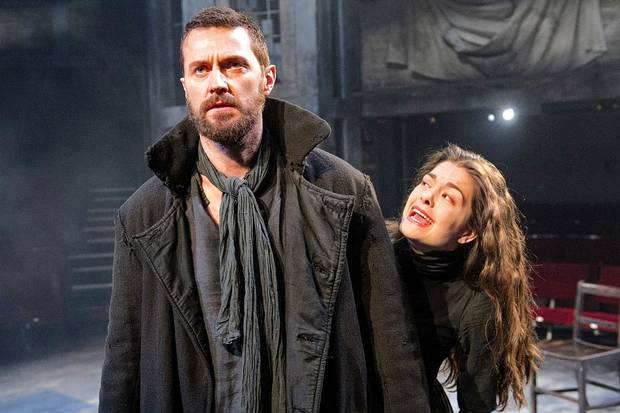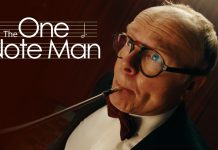(Apologies for the quality of sound, it was very hard for the dictaphone to pick up on it clearly in the theatre).
Sat under the blaring, yellow spotlights, two red chairs and a single wooden table were placed strategically centre stage at the Old Vic in London.
The chattering audience was abuzz with excitement and sat patiently anticipating the arrival of the man they had all come to see – that man being Richard Armitage.
To a rapturous and welcoming applause, he took his place stage left and smiled graciously at his spectators, ready for his potential grilling by theatre critic Matt Wolf to discuss all things The Crucible – the play he is currently starring in as John Proctor.
MW: Many thanks to Richard Armitage for speaking with us today. I saw the preview for this production and actually wrote the preview for this, 5 or 6 performances in. Now it’s in the last two weeks of the run, is it a very different production?
RA: It’s hard to know because we have been with it every single day it’s a bit like watching your child grow or trying to lose weight. It certainly has embedded in me deeper than that first exploration in front of the audience. The first time we performed it I was so shocked at the laughter of the play, the humour, the gasps, the shocks, the breathing of the audience and the emotion by the end of them. That has stayed with us throughout the run. I think we are just so much deeper into it so the descent of my character and the ascent, hopefully is higher.
MW: How did you end up in the production? It has been a dozen years of war since you last did a play in London…
RA: According to the Daily Mail it has been 13 years! My agent and I thought that… every year we talk about doing a play and in my head I thought it had only been five years since I had been on stage, so when I read that it had been 13 years, I was shocked and slightly ashamed. But it wasn’t for want of trying. What we were looking for is exactly what we had found at this moment in time. What I believe in really is that it’s about being in the right time and place. This particular play and this particular director, in this theatre, in this configuration, it just felt absolutely right. We talked about doing something that would be an event and certainly for me, it feels like it has been a real event and I’m sorry that we are in our final two weeks now.
MW: So, was there a sort of phone call? John Proctor, Old Vic, Yael Farber, yes or no?
RA: It was a ‘do you want to do The Crucible?’ I said ‘yes’ because it’s a play that I coveted since I was at drama school. When I was at drama school, there were four actors playing John Proctor in my first year and I tackled Act 4 of the play, so I had a tiny sample of what this character was and I was a 20-year-old actor who knew nothing about life, so coming back to it in rehearsals, or even the potential to come back to it, something had touched me and ignited me and my teachers. You know when you have done something significant because nobody says anything and everyone of my tutors looked at me and I knew that I had done something different. So the chance to come back and explore that, as a… 42-year-old… (giggles), it was kind of exciting and thrilling.
I was filming up in Leeds, I was on an independent movie and Yael travelled up. I think we had about an hour because she was about to go on to a plane to go back to Montreal. We met for breakfast and I was absolutely exhausted and so was she and she said ‘what scares you about this play?’ I said ‘I don’t know if I can do it.’ She said ‘why?’ and I said ‘the play makes me want to burn my own flesh off my body and I can’t do it.’ She said, ‘well I will take you there. I will take you to the edge. We will go there together.’ It’s something I have never forgotten – that meeting. I’m so glad that we did go to the edge together.
MW: So what was the experience of having 25% of the play already in your muscle memory like?
RA: The final quarter of the play are words that I still find them hard to say and hard 20 years ago, but I never had to revisit a kind of drill of learning the lines of that portion, it somehow stayed in my mind, or somewhere in my body. It was just a gentle reminder of what the words were and what they meant. Every night I get to Act 4 and think what a privilege it is to take a character to that place with those lines. Sometimes I think ‘ I don’t know if I can do this today. I don’t know if I can get there, but the play takes you there, the lines take you there and Miller absolutely takes the character from there to there. When he calls to God at the end and I sort of see a particular light and for some reason it just catches me in the eye and I feel an ascent. It’s amazing. With a great playwright like Arthur Miller, you know why when you are inside the character like that.
MW: It’s been a pretty extraordinary year in London for American plays, was the American cannon a large part of your training when you were in LAMDA?
RA: We were very lucky. We had an opportunity to explore drama, which was largely based on classical theatre, so you start with Shakespeare, Greek, but we did tackle Tennessee Williams, Sam Shepard, Arthur Miller… so I had a taste of everything and obviously The Crucible is on many curriculums in school…The whole point of theatre is being introduced to other cultures and find your introduction to other cultures.
MW: Was it interesting finding the voice for this role? Not just how he should sound, but also to get you across eight shows a week and across three months?
RA: Yeah, it was an ongoing experiment I suppose. Often when I tackle characters for TV or film, you have to decide what kind of voice you are going to produce and then go away and work on it. With this, I never made that decision. We decided on a certain vernacular, a dialect, which would be appropriate, so they felt like commoners. I also wanted a commanding voice. I felt like a man who worked out in the fields, calling to his animals. I wanted a certain tone, which commands authority. (Reads out a description of Proctor by Arthur Miller).
When I first met Proctor, I felt like a fool in his presence and I tried to figure out why. It is still something to do with that dignity, despite his grassroots. I think that the fact that he had the ability to make others feel foolish, he was singled out as someone who would be defended by others and that’s exactly what happened to him in the play. It resonates with others… sorry you’re talking about the voice aren’t you… (bursts of laughter) My voice is something, which has evolved throughout the play and I think I had one particular dodgy matinee where I got a bit of carrot stuck in my throat from Elizabeth Proctor’s stew and literally for the other half of Act 2, I am trying to choke my way through and then after that at the stage door everyday were pots of honey. I work with a teacher who is a brilliant woman and guided me through this. Ten years ago when I wanted to go back onstage, I got into contact with her and I said ‘I need a voice. I need to find that voice again.’ It (the voice) has been a constant maintenance.
MW: You said it was ten years ago when you wanted to go back on stage, so it has taken ten years…
RA: Well, I called her and went ‘do you remember that conversation…?’
MW: You were saying that one of the attractions of this was the configuration of course, what was it about being in the round that was important to you?
RA: It’s interesting because I was in a musical called ‘Cats’ years and years and years ago, and all of my favourite plays at drama school was in the round, so my experience of theatre at its best has been either in traverse or theatre in the round. I love that immediacy and the way as an audience member I like being in the round as well. It’s great because you get to see the audience across the space experiencing the same play. There’s something very particular about this play, as an audience we become a witness as to what is happening and we witness each other witnessing it. I think that has ignited every audience member who has come and seen this play. It will be sad to see the Old Vic go back to its familiar state, but it is a national monument so it should.
MW: Actually, I’d like to talk more about that sense of having the audience so present, do you feel it brings the audience in or do you feel distracted by what somebody is doing in the front row?
RA: The audience is as fascinating as the people on stage – not visually – I have 21 other faces that are compelling me in this space, but you have to sense the audience and we feel the audience acutely. As I said earlier on; breathing with the play, laughing with the play, crying with the play, gasping with shock and being outraged, sometimes you can really hear a vocalization of that, which actually feeds the play, it propels us forward, it makes us dig deeper. Obviously the mobile phones are… actually we have been very lucky, we have had one or two and we came to an agreement that we would stop and not make it an issue. I like the fact that the audience feel that they can be vocal and that they are as present in this world as we are. Sometimes you just blur your eyes slightly when you get too close to someone who is wearing a very bright outfit. I think Yael really wanted something to cover the first couple of rows with some black clothing, so that for other audience members there wasn’t any bright colour in this dark, somber world, but I think that is something which was too hard to achieve and at the same time I do think it’s quite good that we do see each other in the front row.
MW: I have seen a lot of productions of The Crucible, but I have never seen a production that has the atmosphere of this one, all the attributes that we associate with Yael. She seems to have such a particular directorial signature. How important was it to you that she was bringing all of these things to the play and what was it about her direction that has really helped the production and you?
RA: She has a very acute awareness of what she calls the ‘viscera’ – I had to Google it to find out what it meant! It’s a full-bodied matter that’s in your body. It’s where the emotions are kept that are in your body, not in the mind, so anything from the neck up is highly intelligent and has its equal place on stage, but she is interested in a full body experience. When Cheever comes in in Act 2 to take my wife, I don’t feel it in my head, I feel it in my stomach, in my knees and in my bowels and that’s exactly what she has programmed the play to be. She worked very closely with a fantastic movement director called Imogen Knight; both of them were inspired by so many different influences. We were listening to some similar music: Arvo Pärt…. And all of those things seem to marry at the same time and it was the first day of rehearsal that we were all in the right rehearsal room with the right people. It was almost accidental.
MW: It is such a detail or affect that must have been there when you were finally putting it all together and it must be in a sense quite startling for the cast to see what they have to do…
RA: I remember we never sat down at the table and read the play; we were always on our feet. We started working on Act 1 got that together and then we would work on Act 2, then we would go back to Act 1 and out Act 1 and 2 together. I remember the terror of getting through Act 1 and thinking, ‘God, that was pretty tough’ and then getting to the end of Act 2 and sort of being on my knees vomiting in a bucket, just from Act 1 and 2, then putting Act 3 on the end. Then, when we finally did all four acts and I was sat in corner shaking and Yael came over to me and said ‘are you ok?’ I said ‘yeah – and we have to do this twice on Wednesday’s and Saturday’s!’ (laughter from the audience).
It’s a bit like running the marathon where the landmarks help along the way, so you recognise; ok I am there in the journey. It’s where the play just sort of takes you and then suddenly you find yourself at the curtain call, but you don’t quite know how you got there… Was that your question..? (laughter).
Part two of the transcript and soundbites will be posted soon.
Please feel free to leave your thoughts below:






























THANKYOU ,..just thankyou …AND …..LEAPING UP AND DOWN , THEY ARE GOING TO FILM IT …YES !!!!
What can I say , brilliant. Thank you !
Fascinating, he really shows how much this means to him and the OLD VIC.
I found it very interesting and thank the interviewer as he also brought out the funny side of this wonderful Actor.
Thank you so much. I hoped every day to get a returned ticket so it’s great to have access to this thoughtful interview.
[…] […]
Thanks so much for this transcript and the sound clip! I would have loved to be able to be there and hear his thoughts on this amazing play. I travelled to the UK to see it (first week) and it was an experience I’ll never forget. Truly visceral, like he says, this play and his performnce literally grabs you emotionally and physically and doesn’t let go for 3,5 hours. What an event it was.
[…] This is part two of the Richard Armitage in Conversation Transcript. You can read the first one here. […]
[…] https://www.filmandtvnow.com/richard-armitage-conversation-transcript-part-one/ https://www.filmandtvnow.com/richard-armitage-conversation-transcript-part-two/ […]
Hi! Thanks for this! I just wondered if you had a recording of the entire talk that you could possibly share with us? Pretty please? It would great to hear it all, even if the sound quality is a bit dodgy (which I didn’t think it was really, I heard everything perfectly!). Thanks :)!
Hi Lily, we do have the full recording, but unfortunately we aren’t allowed to use it all in its entirety. It was filmed though, so hopefully they will release the footage of the conversation for you all. 😉
[…] Richard Armitage In Conversation – Transcript (Part 1) […]
Comments are closed.